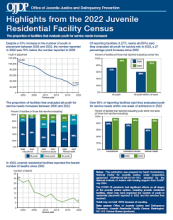Juvenile correctional facilities
Correctional Experiences of Youth in Adult and Juvenile Prisons
Acceptability, appropriateness, and feasibility of Rural School Support Strategies for behavioral interventions: a mixed methods evaluation over two years of a hybrid type 3 implementation-effectiveness trial
Addressing Literacy Skills of Adolescent Girls in a Juvenile Justice Facility: Using the Self-Regulated Strategy Development Instructional Approach to Improve Written Summaries
National Juvenile Data Analysis Program: Final Research Report
COVID-19 Policies in US Juvenile Facilities: A Lessons Learned Report
An Evaluation of a Statewide Approach to the Prevention and Intervention of Violence Using School Threat Assessment Teams
Reduced Recidivism and Increased Employment Opportunity Through Research-Based Reading Instruction
Youth, Guns, and Violence in Urban America
Patterns of Violent Crime: A Longitudinal Investigation
Issues in Contracting for the Private Operation of Prisons and Jails - Executive Summary
Economy - Minnesota Community Corrections Act Evaluation
Appropriateness of Sanctions - Minnesota Community Corrections Act Evaluation
A Mixed-Methods Approach for Embedding Cost Analysis Within Fidelity Assessment in School-Based Programs
Tapestry Program
PBIS in Challenging Contexts: Evaluating a Replicable Implementation Approach in Philadelphia
NIJ School Safety Research and Evaluation
What We Have Learned
With approximately 100 studies completing in recent years, NIJ has sought to aggregate and disseminate findings from these studies. Some projects studied the root causes and consequences of school violence, while others evaluated innovative school safety strategies. This dissemination effort is intended to assess what we have learned, help...
30 Years of the Violence Against Women Act: Endurance, Expansion, and the Next Era
Summary of a plenary panel from the 2024 NIJ Research Conference
Community-Based Alternatives to Youth Incarceration
ADEQUACY OF DIFFERENTIAL ASSOCIATION THEORY
Highlights from the 2022 Juvenile Residential Facility Census
Redesigning Life in U.S. Prisons
The prison system in the U.S. typically places a heavy emphasis on security, control, and punishment, and this foundation can create an adversarial culture within correctional facilities — incarcerated individuals versus correctional staff. But what if that culture could change? What would it look like? How would it impact not only incarcerated individuals but also correctional officers and other staff?
Understanding the Impact of COVID-19 on Victim Services
The COVID-19 pandemic had a detrimental impact on communities across the nation and significantly affected various aspects of individuals’ lives. One of the negative impacts was an increase in gender-based violence accompanied by shifting barriers to accessing services and support. Victims and victim service providers faced various challenges dealing with the increase in need for services, navigating barriers to help-seeking, and addressing logistical issues.
See the YouTube Terms of Service and Google Privacy Policy





